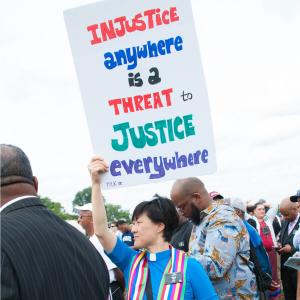
Damon T. Berry, author of Blood and Faith: Christianity in American White Nationalism, is assistant professor of religion at St. Lawrence University in Canton, N.Y.
Posts By This Author
The Apocalyptic Visions of Conspiracy Christians
QAnon narratives have been woven together with Christian visions of a final battle.
FOR MORE THAN a century, evangelical Christians in the United States have frequently and variously imagined an apocalyptic upheaval that would usher in a new world. Evangelicals have had no shortage of appetite for cataclysmic stories, though they have differing interpretations of the biblical texts that describe the “end times,” as demonstrated by the popular appeal of the Left Behind series in the early 2000s. This craving is evident in the way that Christian visions of a final battle between the forces of darkness and light have been woven together with the conspiratorial narratives of QAnon.
In the U.S., Australia, and elsewhere, the far-right conspiracy theory QAnon is growing rapidly among New Age adherents and anti-vaccination communities. However, as religion reporter Katelyn Beaty has noted, there is explicitly Christian-sounding language in QAnon messaging. Explicit examples of the blending of Christian apocalyptic language and the QAnon conspiracies can be found in web posts and books published in the wake of the alleged “revelations” of the anonymous web poster “Q.” In these texts, Donald Trump is often presented as God’s anointed, an equivalent to King Cyrus, battling the diabolical forces of the “Deep State” (a conspiracy theory that posits a hidden government working within the legitimately elected government). The Deep State—supposedly composed of individuals such as Hillary Clinton, Pope Francis, and well-known celebrities who are often described as demonically controlled—is said to be guilty of the most savage crimes, including child sex trafficking and using their victims’ blood to extend their own lives.
Is Christianity a Problem for White Nationalists?
If it isn't, it should be.
CERTAIN FORMS OF Christianity have long shared space with the political and nationalist Right in the United States. The history of white racist religion in the U.S. has also followed the line of a nativist ideology informed by a certain understanding of U.S. Protestant Christianity.
In the 1920s, the Ku Klux Klan sought to preserve Anglo-Protestant supremacy in the U.S.—especially in the face of immigrants from outside Western Europe. Later arose a particular form of racist ideology known as the “Christian Identity” movement, influential in racist organizations into the 1990s.
More recently, racialized Christian mythologies are no longer the dominant ideologies motivating white supremacists. Why has Christianity become problematic for white nationalists?
My own research reveals that Christianity is a problem for many American white nationalists because it is regarded by them as an ideology that weakens the allegedly natural instincts for racial preservation. The main objections to Christianity from contemporary white nationalists have been that 1) Christianity is of Jewish origins, and 2) that Christianity teaches, ultimately, values such as universal brotherhood of all people and the responsibility for everyone to care for one another. These are values that white nationalists have labeled “socialism” and ultimately alien to white racial nationalism.

